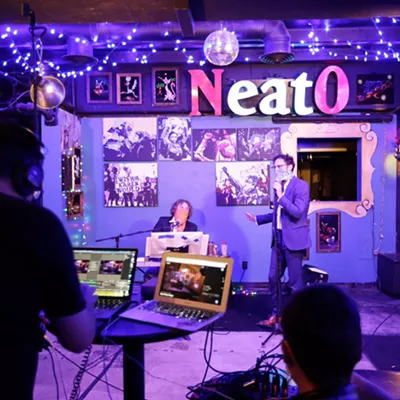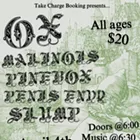DJ Messiah agrees with Pink. Yes, that Pink. The pop star who dyes her hair pink and wear shirts that say 'pink' and who sings about kicking butt and getting into all kinds of Pink-ish trouble.
But she also sung something that struck a chord with Messiah: God is a deejay. To listeners, it's something we can't understand. But in Messiah's mind, it's a statement that he says is true.
"You have full control over a crowd of people. It's like holding clay in your hands and molding it the way you want to," Messiah, aka Jason Purdy, says. "You can make everyone chill out, you can send them a message, or you can choose to just rock their faces off."
It's funny to hear this from someone who is neatly sporting a wrinkleless Bank of America polo shirt -- one that is neatly tucked into a pair of pressed khakis. (Messiah is chatting with me on his lunch hour.) But Purdy doesn't seem to want to talk much about his corporate day-job. It's clear that being a deejay, rocking crowds and watching the Spokane electronic scene develop is where his passion lies. The bank shirt is just his Clark Kent daytime disguise.
Because in watching him at his weekly Thursday night gig at the Twilight Room, Messiah seems to truly act on that superhero-like power he has over his loyal listeners. Behind the turntables, he's like Superman. Standing in the corner of the dimly lit blue room, he cocks his enormous headphones onto his left shoulder, bouncing to the beat and casting sly glances at the crowd -- perhaps trying to gauge a reaction to his performance or simply to watch the one woman dancing to his performance. Bottles clank, the cash register processes another order, the Eighth Element's oxygen tanks whir in the corner and the bathroom door slams open and closed. But the whole time, Messiah keeps the beat going -- switching off with DJ O.S.H, the other resident deejay, between break beats and house music.
As he plays, a friend snaps pictures of his performance. Messiah stops, gives the camera a middle finger, laughs and continues fiddling among switches and knobs, vinyl and headphones. The lone dancer takes a break, and continues back to the undesignated dance area with one more friend. They dance, more join, Messiah continues. By 11:30 the place is packed, and the Twilight Room owners and brothers Ramsin and Ramon Amirkhas pump their fists to the beat from their spots behind the bar.
For Purdy, becoming DJ Messiah began when he was in high school, slowly transitioning from watching a friend's brother mess around with turntables to building his own vinyl collection and equipment base, to starting his own deejay company, Element Tribe Networks.
"I started playing house parties and a couple club spots in southern Idaho, Utah, Montana and Washington."
Since coming to Spokane, the weekly electronic night is something Purdy has been waiting to see. After he and DJ O.S.H. finally found a permanent home for their sounds at the Twilight Room, which opened in late 2003, the pint-sized bar has seen more and more electronica fans each week.
The weekly music spot is something that Purdy says can be instrumental in improving Spokane's nightlife, and providing a more diverse music scene. Thursdays at the Twilight are for everyone, he says -- not just techno fans. And, for the record, it's not a rave.
"I hate that word because it's got a bad name and a bad interpretation," Purdy says. "At the Twilight Room, we're just getting like-minded people together."
The Amirkhas brothers, having worked at Havana's Nightclub until it closed last year, are fans of the electronic sound and are hoping to mobilize local electronic music composers into creating a larger scene.
Ramon Amirkhas, who is a deejay himself, will host a seminar for those interested in making more electronic music this Sunday at 7 pm. He's held seminars like this in the past -- poorly attended ones -- but thinks more people will turn out for this weekend's event.
"There are a lot more bedroom deejays now," he says. "This is for everybody who is interested."
Amirkhas will have all of his equipment, including a sampler, at the event, and encourages local composers to bring their demo tapes to the networking and informational seminar.
Messiah and O.S.H. will be there, as well as other Spokane-area deejays, hoping to get the scene going and showing techno fans just how great it is to be a God at the turntables.
Yodelin' Fools
There's something to be said for kitsch, especially when it's high-quality kitsch. That's a perfect description for the delightfully fun quartet, Riders in the Sky, coming to the Met this Saturday. The Riders -- Ranger Doug, Too Slim, Woody Paul and Joey the CowPolka King -- deliver classic American cowboy songs and swing hits with tight harmonies and plenty of hot licks. The band pays tribute to the American tradition of the singing cowboy, popularized by the Sons of the Pioneers, Roy Rogers and Gene Autry, but they're not above poking a little fun at the genre with their original compositions. Not only that, but they'll yodel and perform a few rope tricks along the way.
The group celebrated its 25th anniversary last year with a new CD appropriately titled Silver Jubilee and filled with favorites from a quarter-century of performing. They've recorded albums for children -- they won their second Grammy in that category last year -- and performed the soundtrack for the movie Toy Story 2.
And doing the singing cowboy schtick on stage isn't the only thing these guys do; Douglas Green, a.k.a. Ranger Doug, lead singer and yodeler deluxe, researched the history of the singing cowboy for his book, Singing in the Saddle, published in 2002 by Vanderbilt University Press.
Cowboy music came from the popular music of the day, Green told NPR's Bob Edwards during an interview last year. "From the Irish and Scottish music, from Vaudeville, from the blues, from Mexican music to just anything that happened to be there," he says. "They didn't have time to really develop a long-standing tradition, so they just took from everything else."
The cowboy songs of the '30s and '40s captured the romance of Western images even as the reality behind the images faded away, and Green clearly loves the music of the era. "Some of it was pretty schlocky, sure, but some of it was absolutely unforgettable," he says.
Although the heyday of the singing cowboy had faded into the sunset by the '50s, the Riders have kept the music alive while bringing new listeners to the genre. "I hope we created a consciousness out there that this music ... wasn't nostalgic, it wasn't just a part of the past," he told Edwards. "It was a living American tradition and [is] still going on."
The Riders are regulars at the Grand Ole Opry and just visited the Nashville music institution last week. They've also appeared often on public radio's Prairie Home Companion. So, all you Spokane buckaroos and buckarettes, mosey on down to the Met Saturday night and give a big Western "Howdy" to Riders in the Sky. And who knows? You might even learn to yodel.
Summer Strings A-Sizzling
In my humble opinion, there is nothing quite so mesmerizing as the sight and the accompanying sound of a classical guitarist utterly having his or her way with a fret board. Whenever there's someone in the room cradling a six-string, locked on and ripping through the scales, I'll eagerly abandon conversation, food and drink just to plug in and soak up the spectacle of supple fingers moving like tentacles up and down the neck in concert with still more fingers furiously plucking in an effort to coax rhythm and warm notes in pleasant succession from nylon. In the face of that, my friends will attest, I am powerless to resist.
There are those who play guitar and then there are guitarists, folks who devote their entire lives, their very souls in some cases, to mastering what just may be the most versatile and lovely instrument in our musical lexicon.
Next Thursday night, classical guitarist Paul Grove and vocalist Silvia Lazo will launch their 2004 Northwest Brazilian music tour in Spokane with a performance at the Unity Church of Truth. Joining them in this celebration of strings and pipes will be Leon Atkinson and visiting artist Mario Ulloa.
Lazo, who was born and raised in Sao Paulo, Brazil, is an active member of Spokane's live music scene. Through performance, she interprets artistic works of Latin American classical, jazz and folkloric music and dance. She also hosts the weekly "Latin Lounge" program on Spokane's Thin Air Community Radio (95.3 FM). Doctor of the classical guitar, Grove leads the Guitar Department at Gonzaga University and regularly performs throughout the United States, Europe and South America.
Together, the Lazo-Grove duo has assembled a smooth and sophisticated repertoire that highlights the historical development of Brazilian music -- from the classical period (including such styles as the Lundus and Modinhas of the 18th and 19th centuries) to Choro and the contemporary sounds of Bossa Nova. Departures to Latin and Iberian-American pieces can be expected from the ensemble along the way.
Guest artist Mario Ulloa joins the duo via the "Guitar Festival: Brazil & amp; Beyond" sponsored by New York's Mannes School of Music. Born in Costa Rica, Ulloa now teaches at the Federal University of Bahia, Brazil, where he received his doctorate in music. He performs regularly throughout Brazil and the world. Also on the bill is local artist and educator Leon Atkinson, a studied classical guitar master and host of KPBX's "Guitar Hour" program.
After next Thursday night's performance, the ensemble hits the road, taking the Sizzling Guitar Summit to Portland then to Seattle.
Publication date: 07/08/04





















